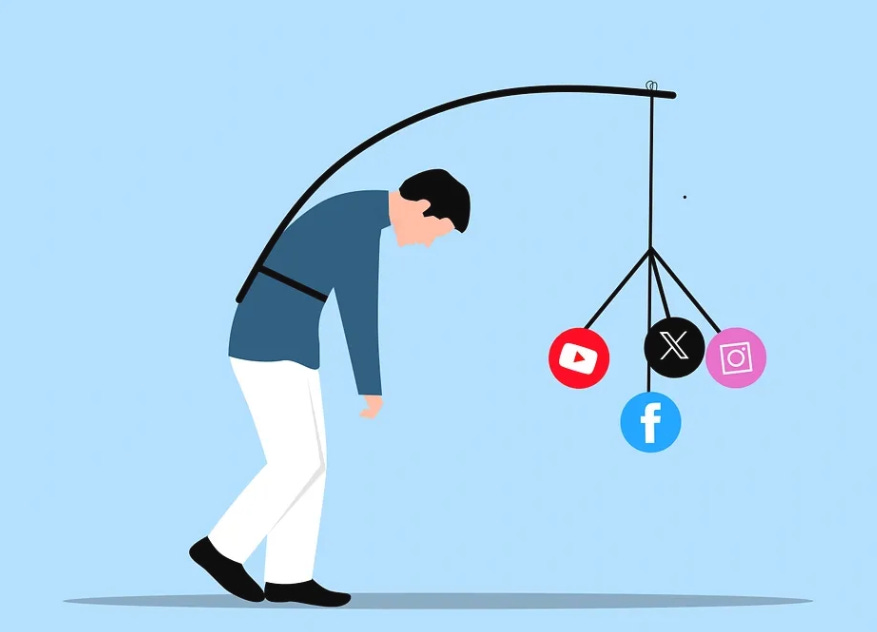[Editor’s Note: This essay was originally a newsletter feature. To receive our monthly newsletter, you can subscribe here.]
I’m in Pablo’s Coffee off 6th, trying to understand how I can feel this hungover without having a drink all week.
The world attacks me with the racket and flash of a pinball machine. Sure, the shop’s busy, but I’m used to that. In fact, I tend to work better in noisy places. But today my defenses are down, and every sound drills deeper into the membrane than normal.
This is all to say that I feel very, very dumb. Doped, in fact. But there’s only one drug I’ve been using this week. And that’s Instagram. More than two hours a day, alas, of Instagram.
Anybody on the app can track their usage. The metrics aren’t too front-facing—kind of like McDonald’s nutritional info. But they are there, the fifth item under “Settings and Activity,” “Time Spent.”
As with many of the toxins accepted in our American marketplace, there are plenty of caveats to be found in the small print. “Please drink responsibly.” “If you or someone you know has a gambling problem…” In Instagram’s case, the obligatory line takes on a coaching tone. “Learn about balancing your time online…Manage your time online,” complete with a bar graph showing hours spent on the app, just like a daily step counter–except that every upward sweep of color here (a delightful hue of blue) represents a negative value.
Nowhere does Instagram explain why you might want to balance your time online. And if you click on one of the links for more information, the app notorious for room temperature IQ superficiality suddenly veers into Socratic pedagogy: “Ask yourself questions like: ‘What online and offline activities are the best use of your time? Are there times when you feel that being online is less important than other things?’”
The rhetoric is a copycat of the kind deployed by soda companies. It’s not that Coke is bad for you; it’s that you aren’t balancing your Coke consumption with a more active lifestyle. A quick online search on the topic conveys oodles of PR flackery devoted to this style of sugar drink damage control. The Coca-Cola Company is apparently sponsoring Boys & Girls Club exercise bootcamps all over the country. Will Instagram someday be forced to sponsor nationwide literacy programs? The Chan-Zuckerberg Initiative (Meta’s answer to the Ronald McDonald House) is currently investing in medicine to address neurodegeneration. And that’s so very good of them. Also a bit coincidental, given what we’re learning about how these apps affect the brain.
Brain-damaged or not, we have arrived at a juncture where using these apps is essential to conduct business, especially businesses like Denverse, where networking with visual artists is crucial. “Are you guys on Instagram?” is a question I’m constantly asked while hobnobbing and hustling for the magazine. Dare I say “No?” No, I dare not, because this desperate Luddite venture in print media needs all the juice it can get. I have to buy something that’s bad for me, and everyone else I subject to it.
The other local business owners I encounter are in the same boat. One of the best things about Denver (say what you will, etcetera) is its rosy entrepreneurial climate. But these small businesses, including yours truly, are beholden to the same titanic powers of Musk and Zuckerberg. No matter their politics or their messaging about loving all things local, at the end of the day most of them are shelling out to Mark and Elon. Over a billion served, reads the famous McDonald’s marquee, despite the brand being almost universally reviled. But there really is nothing so sublime as an Egg McMuffin before a road trip. And, admittedly, Instagram has been a very important tool in getting the word out about this retro medium.
Yes, the ironies come heavy. In a land of burgers and fries, I’ve made myself a vegetable monger. And, to make matters worse, here I am canvassing on the virtues of my turnips from the burger counter, bloated from my weeklong binge, and awaiting the next tray of followers and likes to arrive. Nom, nom, nom.
It sounds like a horror, but it’s really not the worst thing. Paper-hanging types like me cherish any opportunity to feel self-righteous, even when that opportunity is steeped in the worst hypocrisies. But we all know how this story ends, and here’s a further irony: the response the mag has received on social media has reinforced the fact that people are hungry for precisely this type of thing. If it’s going to exist, it needs to be sustainable.
To my surprise, we’ve been getting dozens of paid subscribers. And almost everyone I talk to—whether they’re just humoring me or not—seems genuinely enthusiastic about a print underground magazine that’s just focused on the Denver scene. It’s not just me. Nor am I the only one aware of just how terrible I feel after using these apps. As I work to draw dollars away from Mr. Musk and Zuckerberg at the local level, that angle has emerged: “Wouldn’t it be nice to advertise your business in a place that isn’t bad for you?”
It’s a work in progress, as is my own relationship with how I use social media for the mag—how I balance my time. As always, it’s a privilege and a luxury just to write—especially here at the twilight of the conventional bard. And, regardless of how brainjacked we are from these apps, I have faith in thousands of years of tradition, and even in good old conditioning—how we are hardwired to feel good, sitting in a coffeeshop like this one, reading a story, a poem, the freewheeling thoughts of a well-meaning neighbor. It will take more than a few generations to kill that feeling. It’s worth the fight.
by Paul M. French
Paul M. French is the founder and editor of Denverse Magazine.






